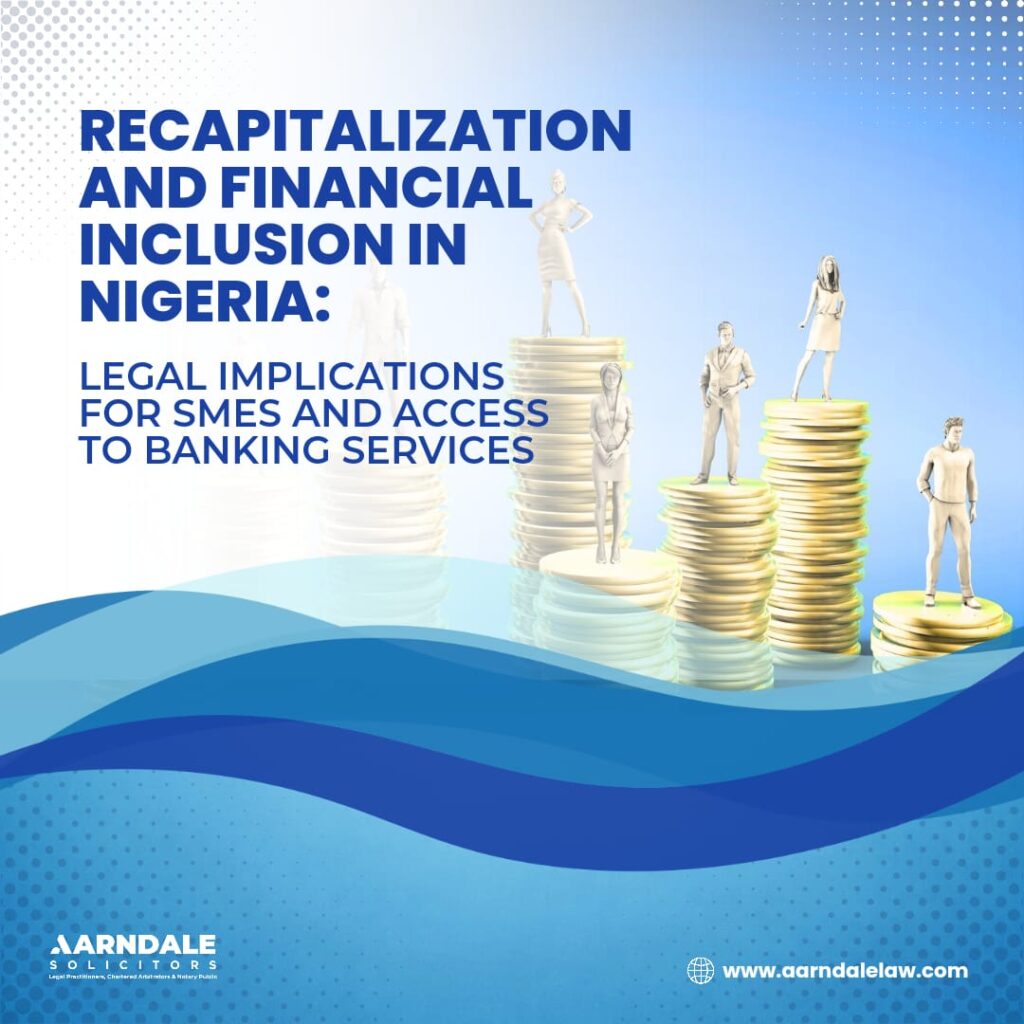

Since 2010, the Global Law Experts annual awards have been celebrating excellence, innovation and performance across the legal communities from around the world.
posted 1 year ago
Background:
Recapitalization is a process often mandated by regulatory authorities to ensure the financial stability of banks. It refers to the process of increasing a bank’s financial strength by raising additional capital.
In Nigeria, the Central Bank of Nigeria (CBN) plays a crucial role in ensuring the stability and soundness of the financial system. To achieve this, the CBN periodically introduces recapitalization policies to enhance the resilience of Nigerian banks. While the primary aim of recapitalization is to bolster the capital base of financial institutions, its ripple effects extend beyond mere fiscal health, impacting financial inclusion and the accessibility of banking services.
The legal implications of recapitalization are profound for small and medium-sized enterprises (SMEs), which are crucial drivers of Nigeria’s economy. This article explores how recapitalization has influenced financial inclusion and access to banking services in Nigeria, with a particular focus on its impact on SMEs.
The Central Bank of Nigeria (CBN) is the principal regulatory body overseeing the banking sector, and its policies on recapitalization are grounded in several legal instruments. The Banks and Other Financial Institutions Act (BOFIA) 2020 provides the legal foundation for the CBN’s authority to mandate recapitalization. Under Section 9 of BOFIA, the CBN is empowered to prescribe the minimum capital requirements for banks[1], which has led to various rounds of recapitalization, notably in 2005, and more recently, March 2024.
The legal framework aims to ensure that banks maintain sufficient capital to absorb losses and protect depositors. However, these mandates also create a legal obligation for banks to comply, often leading to mergers, acquisitions, and the consolidation of smaller banks that struggle to meet the new capital requirements.
In March 2024, the CBN announced a recapitalization policy that increased the minimum capital requirements for “commercial,” “merchant,” and “non-interest banks” in Nigeria, effective from April 1st, 2026. This means that banks in Nigeria have now been given 24 months (April 1, 2024, to March 31, 2026) to raise the required funds.
The circular announced[2]:
The main objectives of this policy include[3]:
Financial inclusion refers to efforts to make financial products and services accessible and affordable to all individuals and businesses, regardless of their personal net worth or company size[4]. Financial inclusion is a critical goal for Nigeria economic development as a significant portion of the population remains unbanked or underbanked. Recapitalization, while intended to strengthen the banking sector, has had mixed effects on financial inclusion.
SMEs are particularly vulnerable to the legal and economic consequences of bank recapitalization. As the backbone of Nigeria’s economy, SMEs rely heavily on access to affordable credit and financial services, which can be disrupted by the recapitalization process.
Recapitalization in Nigeria’s banking sector, driven by legal mandates, has had significant implications for financial inclusion and the access of SMEs to banking services. While the process has strengthened the capital base of banks, ensuring greater financial stability, it has also presented challenges, particularly for underserved communities and SMEs.
On this premise, Policymakers must strike a delicate balance, ensuring financial stability while promoting greater access through supportive regulations and lending policies. Also, the insurance industry can leverage on Bank’s risk aversion, in counterbalancing SMEs need financial liquidity and the Banks need to be guaranteed repayment on their loans.
The content of this article is intended to provide a general guide to the subject matter. Specialist advice should be sought about your specific circumstances.
[1] Section 9 BOFIA 2020
[2] Harlem Solicitors (24th May, 2024) “CBN Recapitalisation Policy 2024: Meaning, Purposes And Implications” CBN Recapitalisation Policy 2024: Meaning, Purposes And Implications – Financial Services – Finance and Banking – Nigeria (mondaq.com) Accessed 12/08/2024
[3] Hope Moses-Ashike (2nd April, 2024) “What CBN recapitalization means for banks, economy” BUSINESS DAY https://businessday.ng/news/article/what-cbn-recapitalisation-means-for-banks-economy/ Accessed 12/08/2024
[4] Mitchell Grant (March 12, 2024) “Financial Inclusion: Definition, Examples, and Why It’s Important” INVETOPEDIA https://www.investopedia.com/terms/f/financial-inclusion. Accessed 15/08/2024
[5] KPMG (July 2024) “Nigeria’s Banking Recapitalization: What Lies Ahead” Nigeria’s Banking Recapitalization: What Lies Ahead (kpmg.com) Accessed 12/08/2024
[6] Hope Moses-Ashike (2nd April, 2024) “What CBN recapitalization means for banks, economy” BUSINESS DAY https://businessday.ng/news/article/what-cbn-recapitalisation-means-for-banks-economy/ Accessed 12/08/2024
[7] Research Department CBN “Financial Inclusion in Nigeria: Issues and Challenges” https://dc.cbn.gov.ng/cgi/viewcontent.cgi?article=1037&context=cbn_occasional_papers Accessed 12/08/2024
[8] David Ijaseun (7th August, 2024) “Path to recapitalization: Seven Nigerian banks strive to restore customer confidence post-currency crisis” BUSINESS DAY https://businessday.ng/backpage/article/path-to-recapitalisation-seven-nigerian-banks-strive-to-restore-customer-confidence-post-currency-crisis/#google_vignette Accessed 12/08/2024
[9] Small Business Insights “Banks’ Recapitalization and Its Implications for SMEs in Nigeria” Banks’ Recapitalization and Its Implications for SMEs in Nigeria – SMALL BUSINESS INSIGHTS Accessed 12/08/2024
[10] KPMG: Nigeria’s Banking Recapitalisation: What Lies Ahead https://assets.kpmg.com/content/dam/kpmg/ng/pdf/2024/06/Nigeria%27s%20Banking%20Recapitalisation%20What%20Lies%20Ahead%20(1).pdf Accessed 15/08/2024
Stay informed with the latest legal developments at Global Law Experts
Author


No results available
posted 12 hours ago
posted 1 day ago
posted 1 day ago
posted 1 day ago
posted 1 day ago
posted 1 day ago
No results available
Find the right Legal Expert for your business
Global Law Experts is dedicated to providing exceptional legal services to clients around the world. With a vast network of highly skilled and experienced lawyers, we are committed to delivering innovative and tailored solutions to meet the diverse needs of our clients in various jurisdictions.

Thinking of buying property in Brazil? Start with a full legal safety net.
✔️ Check title and ownership history
✔️ Verify no debts or disputes
✔️ Confirm zoning and permits.
#BrazilProperty #RealEstateInvesting #LegalDueDiligence #ForeignInvestment #PropertyLaw #GlobalRealEstate #InvestmentRisk #BrazilLaw

When your international business faces financial distress, quick action is key! 🔑 Negotiating with creditors, restructuring debt, and understanding insolvency laws can help regain stability. Global Law Experts is here to guide you through your options.
🌍Explore the details on our website.
🔗Link in bio
#GlobalLawExperts #CommercialLaw #BusinessLaw #LegalAdvice #BusinessGrowth #LegalTips #BusinessStrategy #LegalCompliance #Law #LegalKnowledge #LegalAwareness #Law101 #LegalEducation #IntellectualProperty

Thinking of buying property in Brazil? Don’t stop at the contract or key handover. Make sure the title is officially registered before calling it yours.
#BrazilRealEstate #PropertyLaw #GlobalInvestment #ForeignInvestors #LegalTips #DueDiligence #RealEstateRegistration #SecureInvestment

Getting a termination notice right now? Know your rights. Valid reason, fair process, proper notice they matter. Don’t let a bad dismissal walk away without accountability.
#EmploymentLaw #WorkerRights #Termination #LaborLaw #FairDismissal #WorkplaceJustice #LegalAwareness #GlobalWorkforce

Running a business is hard enough — lawsuits shouldn’t make it harder. 🚫 Protect your business with the right legal strategies and expert tools from Global Law Experts. Let’s secure your future together! 💼
🌍Explore the details on our website.
➡️www.globallawexperts.com
#GlobalLawExperts #CommercialLaw #BusinessLaw #LegalAdvice #BusinessGrowth #LegalTips #BusinessStrategy #LegalCompliance #Law #LegalKnowledge #LegalAwareness #Law101 #LegalEducation #IntellectualProperty #Infringed #Ecommerce #LegalBranding
Global Law Experts is dedicated to providing exceptional legal services to clients around the world. With a vast network of highly skilled and experienced lawyers, we are committed to delivering innovative and tailored solutions to meet the diverse needs of our clients in various jurisdictions.

Thinking of buying property in Brazil? Start with a full legal safety net.
✔️ Check title and ownership history
✔️ Verify no debts or disputes
✔️ Confirm zoning and permits.
#BrazilProperty #RealEstateInvesting #LegalDueDiligence #ForeignInvestment #PropertyLaw #GlobalRealEstate #InvestmentRisk #BrazilLaw

When your international business faces financial distress, quick action is key! 🔑 Negotiating with creditors, restructuring debt, and understanding insolvency laws can help regain stability. Global Law Experts is here to guide you through your options.
🌍Explore the details on our website.
🔗Link in bio
#GlobalLawExperts #CommercialLaw #BusinessLaw #LegalAdvice #BusinessGrowth #LegalTips #BusinessStrategy #LegalCompliance #Law #LegalKnowledge #LegalAwareness #Law101 #LegalEducation #IntellectualProperty

Thinking of buying property in Brazil? Don’t stop at the contract or key handover. Make sure the title is officially registered before calling it yours.
#BrazilRealEstate #PropertyLaw #GlobalInvestment #ForeignInvestors #LegalTips #DueDiligence #RealEstateRegistration #SecureInvestment

Getting a termination notice right now? Know your rights. Valid reason, fair process, proper notice they matter. Don’t let a bad dismissal walk away without accountability.
#EmploymentLaw #WorkerRights #Termination #LaborLaw #FairDismissal #WorkplaceJustice #LegalAwareness #GlobalWorkforce

Running a business is hard enough — lawsuits shouldn’t make it harder. 🚫 Protect your business with the right legal strategies and expert tools from Global Law Experts. Let’s secure your future together! 💼
🌍Explore the details on our website.
➡️www.globallawexperts.com
#GlobalLawExperts #CommercialLaw #BusinessLaw #LegalAdvice #BusinessGrowth #LegalTips #BusinessStrategy #LegalCompliance #Law #LegalKnowledge #LegalAwareness #Law101 #LegalEducation #IntellectualProperty #Infringed #Ecommerce #LegalBranding
Send welcome message